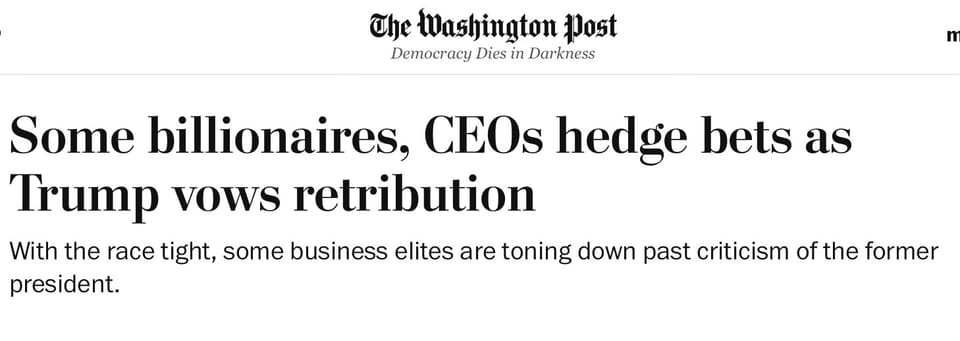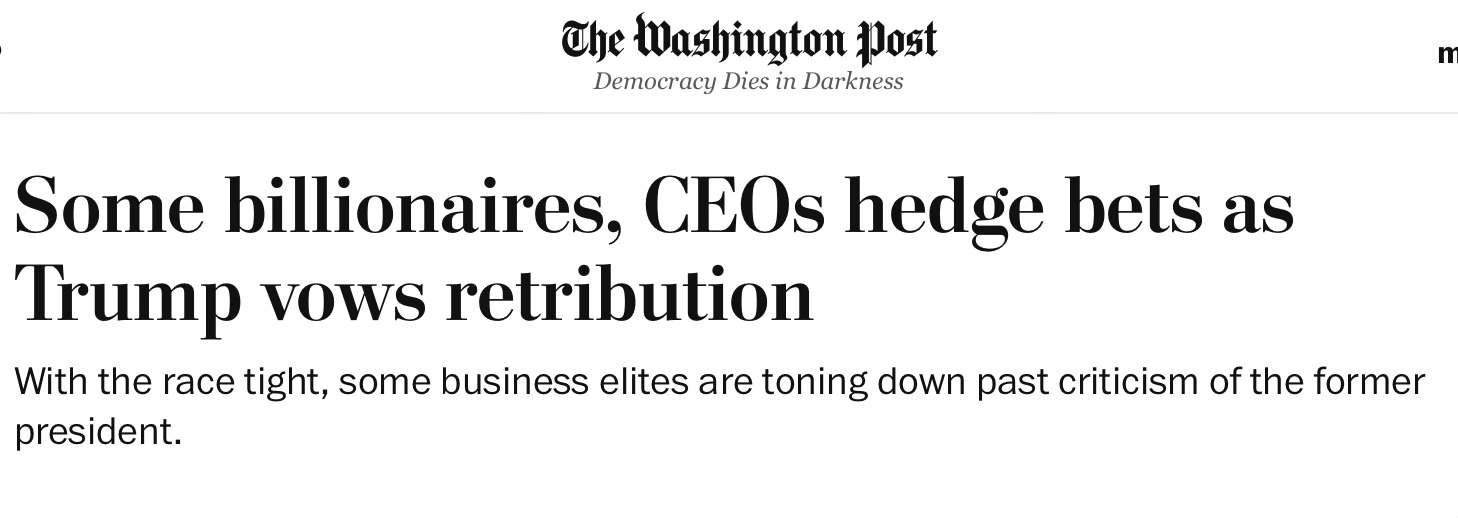Jeff Bezos is full of it

Washington Post owner/world’s-second-richest-man Jeff Bezos has just published a ham-handed effort to stop the bleeding after seeing more than 200,000 Post subscribers cancel their subscriptions over the weekend in response to Bezos blocking his paper’s editorial department from endorsing Kamala Harris. Bezos’s defense of his actions is either shockingly dishonest or shockingly foolish — or, more likely, both.
The foundation of Bezos’s defense of his decision to selectively end the norm of Washington Post candidate endorsements1 is this hot mess:
Our profession is now the least trusted of all. Something we are doing is clearly not working.
Let me give an analogy. Voting machines must meet two requirements. They must count the vote accurately, and people must believe they count the vote accurately. The second requirement is distinct from and just as important as the first.
Likewise with newspapers. We must be accurate, and we must be believed to be accurate.
This is extreme nonsense.
In fact, it is considerably more important to count votes correctly than to be perceived as counting votes correctly.
This is because, first of all, the most important thing in a democracy is that a fair system produces a result that reflects the outcome reflect the will of the people. Nothing is as important as that. And second of all, perception is not a monolith. The statement that “people must believe [voting machines] count the vote accurately” sounds good, but what does it mean? Which people? Every person? Three-quarters of the people? A simple majority? A plurality?
America is a nation of 330 million people. A heck of a lot of them believe a heck of a lot of nonsensical and false things. Tens of millions of them believe nonsensical and false things because Donald Trump tells them to believe false things, such as that he won the 2020 presidential election. These people will distrust election results that disfavor Trump no matter what; they will distrust news coverage and editorials that disfavor Trump no matter what. You cannot win their trust; Donald Trump already has it.
By explicitly saying he values the perception of truth as highly as truth itself, Bezos sets for the Post an impossible standard — and in effect gives Donald Trump veto power over the Post’s coverage.
In Bezos’s formulation, an accurate Washington Post article that is widely distrusted (say, by Trump supporters) is no better than a false Fox News report that is trusted by the overwhelming majority of Fox News viewers: They each meet one of two equally-weighed conditions Bezos sets out for the news media: Accuracy and the perception of accuracy.
Back in May, I wrote of the New York Times:
Again and again and again, the New York Times tells us that winning the trust of Republican (non-)readers is a key motivator in the paper’s approach to journalism. Criticized for treating unequal things as equal, for blurring asymmetries between candidates, the Times insists that to do otherwise would cause the paper to lose the trust of Republicans, who already do not trust the Times and never will, which means the Times just keeps lurching rightward to appeal to people who keep moving further and further away from it.
In short: The Times defends itself from criticism for presenting a distorted view of the choice between Biden and Trump that blurs the asymmetries between the candidates by insisting that it must do so in order to appeal to Trump supporters.
This is simply not what “independence” means.
Bezos is making the same mistake now. By insisting that perception of the newspaper is as important as the content of the paper, he is chasing the trust of an audience that will never trust the Post, and doing so by he is abdicating the paper’s role in democracy: Helping readers understand the choices before them so that they can make informed decisions.
Jeff Bezos has made clear that he is simply not a man who has any business owning a newspaper. Except, of course, business is likely the precise reason why Bezos does own a newspaper. Which brings me to his extraordinarily unconvincing denials that his decision was in any way motivated by his massive personal fortunate of more than $200 billion, which stands to increase significantly if Donald Trump becomes president and cuts taxes for billionaires and steers government contracts to those who help him — and which would be in jeopardy of Bezos angered Trump, given Trump’s vows of retribution against those who oppose him.
Here’s Bezos:
I would also like to be clear that no quid pro quo of any kind is at work here. Neither campaign nor candidate was consulted or informed at any level or in any way about this decision. It was made entirely internally. Dave Limp, the chief executive of one of my companies, Blue Origin, met with former president Donald Trump on the day of our announcement. I sighed when I found out, because I knew it would provide ammunition to those who would like to frame this as anything other than a principled decision. But the fact is, I didn’t know about the meeting beforehand. Even Limp didn’t know about it in advance; the meeting was scheduled quickly that morning. There is no connection between it and our decision on presidential endorsements, and any suggestion otherwise is false.
When it comes to the appearance of conflict, I am not an ideal owner of The Post. Every day, somewhere, some Amazon executive or Blue Origin executive or someone from the other philanthropies and companies I own or invest in is meeting with government officials.
[…]
You can see my wealth and business interests as a bulwark against intimidation, or you can see them as a web of conflicting interests. Only my own principles can tip the balance from one to the other. I assure you that my views here are, in fact, principled, and I believe my track record as owner of The Post since 2013 backs this up.
Convinced? Yeah, neither am I. How could we be? Bezos offers nothing but his own word. And what is Bezos’s word worth, just days after he sent the Post’s publisher out to lie to readers about the reason for the decision?
Even people on Bezos’s payroll aren’t buying it:
@washingtonpostHere’s why some billionaires are going soft on Trump. With the White House appearing increasingly up for grabs, and especially as polls have tightened, numerous billionaires and other leading executives have taken steps in recent months to stay out of the race — even if they had criticized Trump after the Capitol insurrection of Jan. 6, 2021, calling his encouragement of the riot a threat to American democracy. Others who previously backed Democrats have stayed silent this election, which some critics and Trump supporters alike have interpreted as a peace offering to the GOP presidential nominee. Two Trump campaign advisers said numerous executives have been trying to reach out to the former president’s team late in the race. “I’ve told CEOs to engage as fast as possible because the clock is ticking … . If you’re somebody who has endorsed Harris, and we’ve never heard from you at any point until after the election, you’ve got an uphill battle,” the Trump adviser said. “People are back-channeling, looking at their networks — they’re talking to lobbyists to see what they can do to connect with the president and his team.” Trump allies hailed what they say are signs of neutrality from other billionaires. Amazon founder Jeff Bezos, who owns The Washington Post, decided that The Post would no longer endorse presidential candidates, a change announced last week. The Post had an endorsement of Harris in the works. That came just days after Patrick Soon-Shiong, who owns the Los Angeles Times, blocked that paper’s endorsement of Harris. Both moves sparked an uproar, with critics saying they reflected concerns about the owners’ financial interests — Amazon has billions of dollars in cloud computing contracts with the federal government, and Blue Origin, Bezos’s rocket company, has contracts with the Space Force and NASA. Soon-Shiong, a biotech investor, could have future business before federal regulators. Caption from original article by Jeff Stein, Jacqueline Alemany and Josh Dawsey.

Tiktok failed to load.
Enable 3rd party cookies or use another browser
Just a few months ago, in June of this year, Bezos and publisher William Lewis told Post employees they would not meddle in the paper’s journalism:
In his note Tuesday, he directly referenced Lewis, who told staff in small meetings last week that, as publisher, he will never interfere with the journalism produced by the newsroom.
“I know you’ve already heard this from Will,” Bezos wrote, “but I wanted to also weigh in directly: the journalistic standards and ethics at The Post will not change.”
Turns out that wasn’t true. And now Bezos wants us to trust him that he had only the noblest of intentions in blocking an editorial endorsement of Kamala Harris that would surely anger Donald Trump.
Today, the Post’s newsroom produced a more likely explanation:

Member discussion